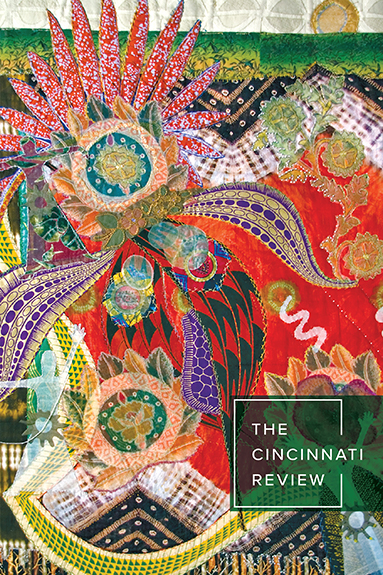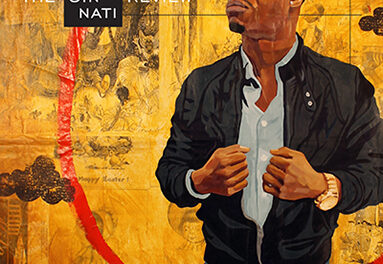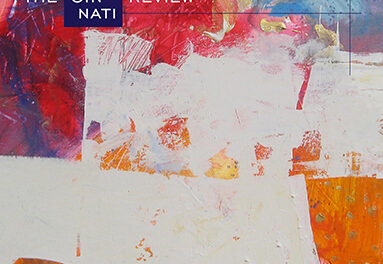Piya has just turned thirty. She works in her family’s hotel. Tonight she will become pregnant. In twenty-some weeks, she will lose the baby, and the state of Indiana will sentence her to twenty years in prison for feticide. One year for every week.
But for now, it is early on Tuesday, and on Tuesdays Joseph comes to restock the soda machine, to bring her a can of 7 Up and chat with her, his arm propped on the counter. He always shares the can with her, reaches over the counter, plucks it from her hand while she pretends to resist. When he hands her the can back, it tastes sweeter, as if his lips have left a coating of sugar where they touched the aluminum. His orange-blond hair resembles pale flames; they burn in Piya’s mind, luminescent, every time she closes her eyes. His speech teeters between provincial Russian and skateboarding American teen. She has this over him—her English is unaccented; she enjoys correcting him, laughing into her hand: “When somebody asks how you’re doing, you don’t say ‘normal.’ You say ‘fine.’ ‘Normal’ sounds weird.”
“Fine,” he says, rubbing his cheek so it rasps. “I’m fine. Is that good, Ms. Piya?”
She likes the way he lifts his chin, says, “How do you call that?” when he wants to know the name of something. When he is not there, she looks around the hotel lobby, at the pamphlets fanned across the desk that nobody ever reads, the fake plants drooping in the corner, the rectangular rug that curls up at the ends, asks under her breath, How do you call that? How do you call that?
Joseph has been their handyman for half a year now, ever since his uncle bent his back wrestling a water heater and could not unbend it. He does it all: fixes the clogged bathtubs, repaints the stained walls, finds and installs new minifridges. Most importantly, he is cheap and resourceful, rewiring a broken coffee machine, unearthing mysterious stockpiles of cement to repair the cracks in the sidewalk, so Piya’s father is happy to let him continue in place of the uncle.
Joseph finds occasions to be near her: showing her pictures of his new car on his phone, each shot identical to the one before it; asking for her signature, standing close to her as she pretends to examine the piece of paper that she is pretty sure doesn’t actually need a signature; wandering into the breakroom when she is there, reaching over her for the sugar packets so she can catch a whiff of his sugary cologne.
She likes the way Joseph stares openly at her chest, one eyebrow raised, with such longing, as if he cannot help himself. She is rarely seen. The customers who check into the hotel are indifferent to her. The fact that they chose this hotel means that they cannot afford something better, but they want to be treated as if they could. They act like they are doing her a favor by staying there. The impatient businessmen scan their eyes over her, find little reason to pause; they fiddle with their phones to give the impression that something important is happening. The groups of college students jostle each other, slide their hands into each other’s pockets. The women shouldering too many bags and pulling on their children’s wrists address her without facing her. She could grow an antenna right before their eyes, and they’d still demand to know why there isn’t a free shuttle to the airport.
Tonight when Donna comes on for the six p.m. shift, instead of counting stacks of paper towels in the supply room and reviewing the housekeeping schedule, Piya will sneak into a room that she knows will be empty and text Joseph that the coast is clear.
As she watches the clock, waiting for Joseph and her morning soda, her phone buzzes in her back pocket; it is undoubtedly Anne, who has been her friend since high school. Anne has short black hair, wears a medallion of Saint Christopher, is a nurse at Lakeview Hospital. She times her smoke break so she and Piya can text each other. Piya unlocks the phone to a text from Anne:
omg kk is blond again
Piya types back:
lol she needs to stop, gurl can’t pull it off
Anne and Piya both love Kim Kardashian, the whole Kardashian clan, follow their exploits with the care of scholars documenting a lost civilization; they could tell you how much North West’s miniature Alexander Wang leather jacket cost or the recipe for Kourtney’s avocado pudding, can rank Khloe’s boyfriends in order of hotness.
Piya hadn’t expected to be working at her parents’ hotel at thirty, but she hadn’t really expected anything else either. She thinks vaguely about how her parents haven’t arranged a marriage for her, haven’t even hinted at it. She senses that they are cut off somehow; that it takes a whole interconnected system of gears and levers to start turning for such an enterprise to be set into motion, and they don’t really have any friends, any family she can think of. There is some unspoken rift, some fracture they don’t talk about. Her father sometimes stops and sighs as he straightens the fake flowers on the front desk or wipes the nonexistent grime from the glass door, announcing that he was Exchequer of Agriculture in Faisalabad; he had one hundred people reporting to him. She doubts this. If that’s true, then why did he come to America, to shiver in the mounds of snow, to serve red-faced men who puff their cheeks at his accent? She knew college wasn’t really a possibility for her; she had spent most of high school looking forward to lunches with Anne, where they’d take turns sharing the food their mothers had packed—Anne’s lumpia and Piya’s chicken and rice—and had graduated with middling grades. Her older brother, Ajeet, was an engineer who specialized in escalator design and installation. Her parents still talked about the time he had taken them to a parking garage that he’d been working on for months. They had taken turns riding up and down the escalators, their mother holding carefully to the handrail and looking down at her sandaled feet.
Ajeet had always been the smart one, collecting trophies and plaques to fill up the living-room mantel, each year nudging Piya’s mug for perfect attendance in the third grade closer to the edge. On the occasions that Ajeet talked to Piya, it was to hand her flash cards he had made. On the cards, in his spiky lettering, there would be a phrase—“Explain Aristotle’s theory on syllogisms”—and he would begin reciting the answer before she was done reading the card.
On other occasions, he explained to her: “You’re too fat, Piya. You could be kind of cute if you lost”—he squinted at her, framing her with his hands—“between 10 and 12.5 pounds. Twenty is ideal, but statistically, it is almost impossible to maintain.” He raised his hands in preemptive defense. “I’m not being mean. Appearances matter in society.” He gestured at his own inoffensive white button-down shirt, his neatly belted Old Navy khakis.
“You look like a confused Mormon,” she said and returned to her bowl of cereal. “Brown-ass Mormon.”
“Vulgarity is not becoming of women either,” he said, pushing up his glasses and scratching his forearm.
“Brown-ass fucking Mormon,” Piya said, letting the milk dribble out of her mouth, and the crunch of the cereal drown him out.
Joseph texts that his truck has broken down; he is running late and will miss the soda restocking. She texts him back three kissy faces. The first time they kissed, she did not see it coming. Joseph took her chin, did it hard and fast, his stubble turning her mouth, the skin around it, pink. The kiss sent her heart skittering down the hallway. Afterward, she sat in her car touching the pinkness. She stared at her half-closed eyes in the vanity mirror. This was what being drunk must feel like.
After that skittering heart went her imagination, rabbiting into the horizon. She imagined him asking her out on a date. Imagined being one of those couples walking through the mall together, him in baggy jeans and a cap with a flat brim, her in a Guess shirt, their hands clasped as if glued together. He would be holding the many shopping bags, would buy her a pretzel, a Godiva hot chocolate; they would browse the jewelry at the Zales and the Pandora. She would post a picture of the ring. He would win her a huge stuffed animal from one of the kiosks, carry it with the legs wrapped around his neck so people would turn and stare.
She skipped over the hard parts: how a non-Muslim was out of the question for her parents, how she wasn’t allowed to date, how she could not possibly compete with the twiggy Russian beauties she was sure Joseph hung out with in his free time. Instead, she imagined they would gather around a Christmas tree, her parents dressed in kitschy red holiday sweaters patterned with snowflakes and reindeer; they would all smile over steaming cups of cocoa. There would be grandchildren running around, a dog would bark at their feet—never mind that her parents despised dogs, that she herself went rigid with fear when they barked.
Piya stands as soon as she hears Donna’s clicking heels entering the hotel lobby. “Out so soon?” Donna asks, slipping off her purse. “You will not believe what they did today,” she says, putting her hand firmly on Piya’s arm. Piya nods while Donna recounts the latest dispute with her credit-card company. When two elderly couples shuffle to the counter and Donna reluctantly turns toward them, Piya sighs in relief. This should take a while. She slips away while one of the women painstakingly unfolds a coupon.
In the hotel room, Piya goes to the bathroom, wets her fingers, smooths the baby hairs off her forehead. She reapplies her eyeliner, reaches into her bra to hoist her breasts back into place. With shaking fingers, she texts Joseph.
. . .










